In tranquillity lies good taste
Soul Food and Slow Food from SouthWest Germany

STUTTGART – Some dishes are automatically associated with home and childhood memories. Soul Food and Slow Food are often closely connected. Above all, good products need two ingredients: love and time. Many producers in SouthWest Germany have already turned the clocks back and are patiently creating specialities with a passion for their own region, providing a counterbalance to hectic everyday life by slowing down to enjoy things. Whether it's directly from a producer or in a sustainably designed restaurant: the way to rest and relaxation here is through the stomach.
Artisan unpasteurised cheese: Langenburg sheep's cheese
Norbert Fischer's Demeter-Hof is nestled between meadows and fields in the Hohenlohe-Langenburg region. What began in the early 1980s with a couple of sheep and a small, self-sufficient farm has now grown into a substantial operation with a huge barn, a cheese dairy, farm shop and home. Everything is made from wood and glass, with cheerful flowering plants on the roofs and plenty of love in every nook and cranny. Over 250 sheep live here with Fischer, their shepherd. He uses their milk to hand produce fine sheep's milk cheese. From tangy Pecorino, to mouth-watering Camembert, and strong "Roque blue" cheese. The range is complemented with organic ice cream and meat, sheepskins and the farm's own picture book.
Fragrant bubbly: Blütenzauber Manufaktur in Bächlingen
The Jagst is one of the Neckar River's largest tributaries. It winds its way from the Eastern Alb, over the Hohenloher and Haller Plain into the Heilbronn district. On the way, it also goes through the little village of Bächlingen. This is where Bernulf Schlauch lives, the Slow Food regional coordinator for Hohenlohe and inventor of blossom champagne. He uses a laborious process to produce sparkling wines from elder, acacia, rose blossom, and meadowsweet – deliberately taking things slowly. "These sparkling wines need time for their flavours to unfold", says Schlauch. For him, Slow Food does not just mean allowing time for the products themselves, but also taking time for guests and delicious food.
Love of the loaf: Eselsmühle mill in Musberg
Eight donkeys, a shop, the Mühlenstube restaurant, a garden bistro, and a wood oven where the Demeter bread is baked. Sounds like the good old days and real proper bread, luckily at the Eselsmühle this is all on offer right now. The mill's history goes back over 600 years, when the local millers supplied surrounding villages with
food. In 1937, the mill was acquired by the Gmelin family, who are still working passionately to preserve it and have created a genuine feel-good location in the extensive grounds surrounding the site, a place where everyday stress is banished. All the products on offer here are certified organic and most come from the local area. Nothing can distract from unsullied pleasure in these beautiful natural surroundings.
Organic fine dining pioneer: "1950" in Hayingen
Located in the heart of the Swabian Alb biosphere is the world's first Demeter & Bioland fine dining restaurant. The "1950" is a new addition to the Tress family's gastronomic offerings and honours the legacy of Grandfather Johannes, with the name marking the year he laid the foundation for the sustainable company philosophy that is still upheld today. The key feature: for every course on the vegetarian "CO2 menu" served here, guests also get comprehensive information about the ingredients. From CO2 emissions, to the distance involved between the producer and restaurant. To avoid producing waste in the kitchen, Simon Tress and his team strictly follow the principles of "leaf to root" and "nose to tail".
Fresh from the field to the table: the Feld-Wirtschaft restaurant in Bermaringen
The "Feld-Wirtschaft" certainly lives up to its name, which means a "field" restaurant. This restaurant epitomises the local production philosophy; you can literally see the ingredients for the dishes that are freshly prepared each day growing out in the fields, and there is always something new to discover and taste. That's because the menu changes regularly in tune with the rhythm of nature. The gardening is done personally by Wilhelm Schmid, gardener and "head of the kitchen". In the lush and colourful field in front of the restaurant, old and forgotten varieties thrive alongside classic vegetables, local and exotic herbs and flowers. No artificial additives are used to prepare the ingredients, and all the fish and meat is organic.
Holistic gamekeeping: Schussental game products in Fronreute
"Once upon a time, there were three hunters ..." – it sounds like the start of a Brothers Grimm fairy tale, but in fact this is how the success story began for the Schussentaler Wildmanufaktur game company in Fronreute near Ravensburg. Their mission: to convince the residents of Upper Swabia to eat game. Game lives in a natural habitat, it is sustainable and largely free from harmful influences, offering the finest quality meat with a favourable environmental impact. Nonetheless, many people have reservations about the taste and are unsure how to cook it. The Wildmanufaktur hunters are doing their bit to restore its image by selling local, freshly hunted game that is ready to cook as a roast or goulash, grilled sausage or meat loaf.
schussentaler-wildmanufaktur.de
Copper pan cherries: Faller jams from Utzenfeld
Whether it's black cherries from Baden, forest blueberries or Bühler damsons: ever since the company was founded in 1913, Faller jams have been cooked in small quantities using traditional, open copper pans and stirred by hand to preserve the natural, original taste of the fruit for the finest possible results. Short transportation distances also contribute to the quality of these jams. To this very day, Faller continues to source large quantities of fruit and berries from the nearby Kaiserstuhl and Markgräflerland regions. This family-run Slow Food business has links with farmers that often go back many years. Their produce can be sampled in the "Therese" jam café. Or you can order jars of these sweet temptations straight from the online shop to enjoy for breakfast at home.
Slow brewing amidst the pines: Rothaus Grafenhausen, Baden's district brewery
Baden's district brewery, Rothaus, demonstrates how you can capture the essence of the Black Forest in a bottle. All you need is tranquillity, care and time. The raw materials also come entirely from the surrounding area: the brewing water bubbles up from local springs in the nearby forest, native spring barley is used as the brewer's malt, the aromatic hops are sourced from Tettnang and Hallertau, and the yeast comes from the company's own pure culture. The "Slow Brewing" seal of approval confirms the exceptional quality and full-bodied, mature flavour of the Rothaus beers. This final feature is undoubtedly also owed to the brewery's special location, up at an altitude of around 1,000 metres, between the Black Forest pines and spruce trees.
As good as granny's: Café Goldene Krone in St. Märgen
The "Golden Crown" has welcomed numerous guests over its centuries-long history. From 1753, it operated as a pilgrims' refuge, later it became a grand hotel. Famous people called by here: from Heidegger to Adenauer. When the hotel was closed in 1990, a hush descended. A citizens' action group halted the threatened demolition and, a good ten years later, went on to rescue this historically significant building and revive the village centre. With huge success: today the "Golden Crown" is once again a popular meeting place. This "countrywoman's café" with a small shop is a fine example of social, economic and environmental sustainability. Instead of trained professionals, the shop and kitchen facilities are run by 20 committed local women, all adding their own special flavour to the regional dishes with their personal recipes.
Downloads
- In tranquillity lies good taste.doc (doc - 683 KB)
- In tranquillity lies good taste.pdf (pdf - 124 KB)
Press images
-
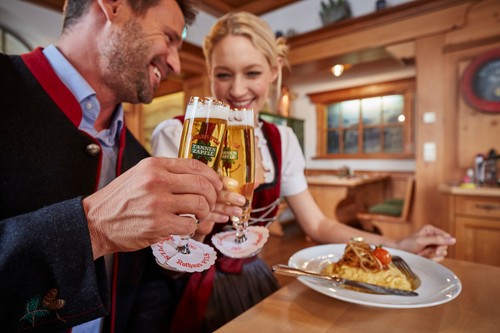
Baden State Brewery Rothaus
downloadCopyright © TMBW_Christoph Düpper Fotographer Christoph Düpper Size 5760 * 3840 (4 MB) -
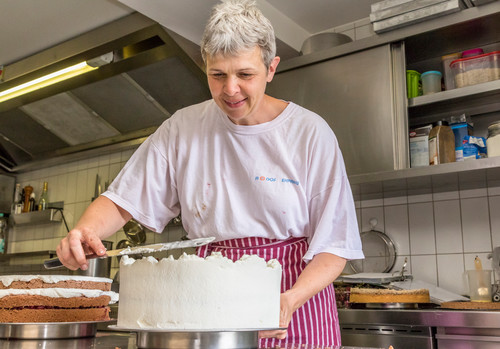
Baking in the Café Goldene Krone
downloadCopyright © Hochschwarzwald Tourismus GmbH Fotographer Size 2559 * 1788 (2 MB) -
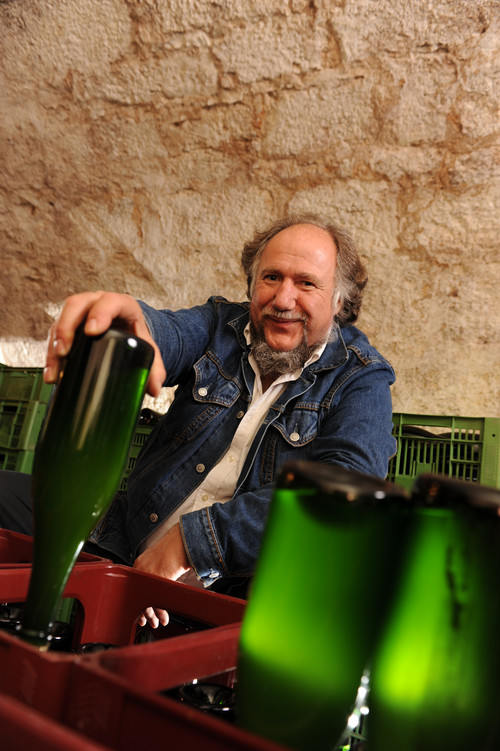
Bernulf Schlauch and his Hohenloher bloosom Champagne
downloadCopyright © TMBW Fotographer Size 2832 * 4256 (5 MB) -
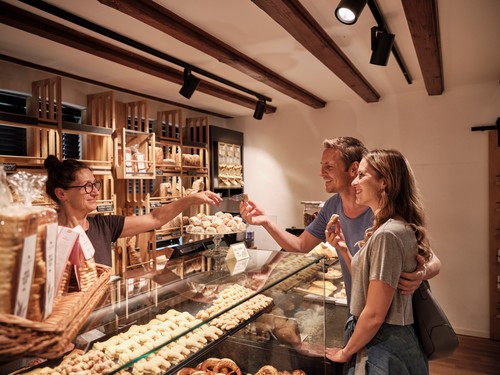
-
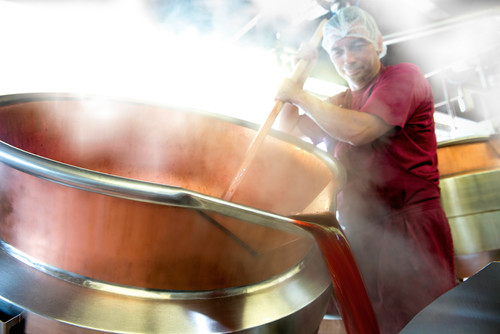
Faller jams from Utzenfeld
downloadCopyright © Konfitürenmanufaktur Alfred Faller GmbH Fotographer Size 2953 * 1971 (630 KB) -
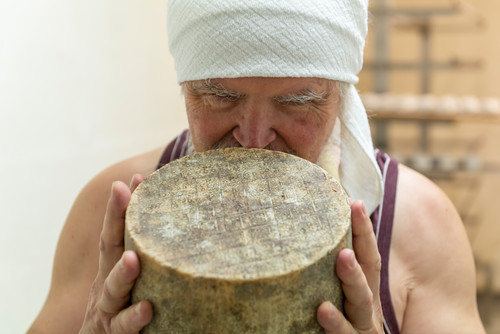
Norbert Fischer and his Langenburg sheeps
downloadCopyright © TMBW Fotographer Size 6016 * 4016 (10 MB) -
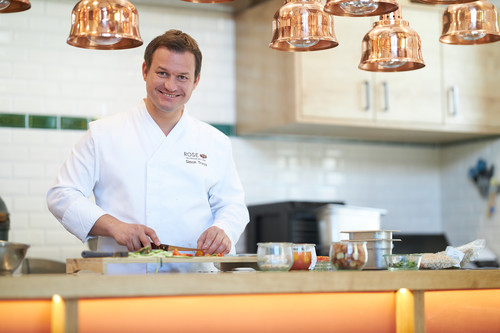
Simon Tress in the organic Fine-Dining-Restaurants 1950
downloadCopyright © Biohotel-Restaurant ROSE Fotographer Size 6378 * 4252 (18 MB) -
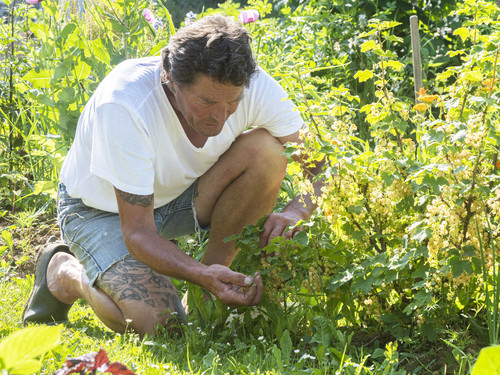
Wilhelm Schmid in the Feld-Wirtschaft restaurant in Bermaringen
downloadCopyright © Helmut Schlaiß Fotographer Helmut Schlaiß Size 3000 * 2250 (2 MB)
